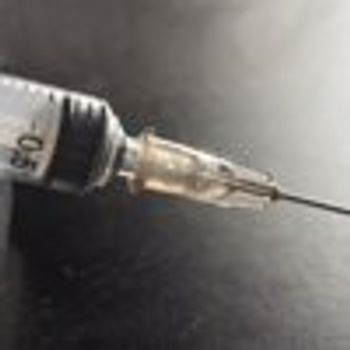
Lenvatinib demonstrated noninferiority to sorafenib with regard to overall survival in patients with previously untreated, unresectable hepatocellular carcinoma.

Your AI-Trained Oncology Knowledge Connection!


Lenvatinib demonstrated noninferiority to sorafenib with regard to overall survival in patients with previously untreated, unresectable hepatocellular carcinoma.

Adding palifosfamide to carboplatin and etoposide failed to improve survival over the latter two agents alone in patients with extensive-stage small-cell lung cancer.

Adding PEGPH20 to nab-paclitaxel and gemcitabine improved progression-free survival in patients with untreated, metastatic pancreatic ductal adenocarcinoma.

Patients with HER2-negative breast cancer with residual invasive disease following neoadjuvant chemotherapy benefit from adjuvant treatment with capecitabine.

Dasatinib was safe and effective in pediatric patients with chronic myeloid leukemia, according to a new study, establishing the agent as a new standard of care for this population.

The novel IDH2-inhibitor enasidenib was well tolerated and offered durable responses in a phase I trial of relapsed or refractory acute myeloid leukemia patients with an IDH2 mutation.

Analysis from a phase III trial confirmed the prognostic value of a 16-gene recurrence score in patients with high-risk renal cell carcinoma undergoing adjuvant sunitinib therapy.

The use of prophylactic cranial irradiation (PCI) reduced the incidence of symptomatic and asymptomatic brain metastases in patients with radically treated stage III NSCLC. The therapy did not, however, improve overall survival, and decreased quality of life.

Androgen deprivation therapy can be safely reduced from 36 months to 18 months in high-risk prostate cancer, according to results of a phase III trial.

Continued enzalutamide with abiraterone failed to improve PFS in men with metastatic castration-resistant prostate cancer who progressed on enzalutamide alone.

Systematic lymphadenectomy in patients with advanced ovarian cancer and complete resection does not improve progression-free or overall survival, and should be omitted, according to results of a new study.

The FDA has expanded the approval for ceritinib. The agent is now approved as a first-line treatment in patients with metastatic, ALK-positive, non-small-cell lung cancer.

Final results from two large phase III trials confirm that the drug-antibody conjugate trastuzumab emtansine improves overall survival over other treatment options in patients with previously treated HER2-positive metastatic breast cancer.

Chromosomal abnormalities such as a variant t(9;22) translocation do not appear to have significant prognostic impact on children with chronic myeloid leukemia.

Final 10-year follow-up of a large phase III trial showed that adding gemcitabine to anthracycline and taxane-based adjuvant chemotherapy increases toxicity and does not improve disease-free survival in early breast cancer patients.

Molecular subtyping of prostate cancer into three categories-luminal A, luminal B, and basal-identifies differences in prognosis and response to treatment.

Urinary testing for PCA3 and TMPRSS2:ERG (T2:ERG) RNA can help avoid unnecessary biopsies while maintaining ability to detect aggressive prostate cancer.

Treatment with intravesical gemcitabine following surgery reduced the risk of recurrence in patients with low-grade non–muscle invasive bladder cancer.

A prospective phase III validation study found that AZGP1 has significant prognostic utility as a biomarker in localized prostate cancer.

Treatment with metformin may improve outcomes in patients with HER2–positive primary breast cancer and diabetes, according to an analysis of the phase III ALTTO trial.

New studies at the AUA Annual Meeting highlight the links between smoking and bladder cancer. In one, smoking intensity was linked to survival outcomes, while two others show that electronic cigarettes likely contribute to bladder cancer risk.

Two new studies presented at the Annual Scientific Meeting of the American Urological Association offer an improved understanding of some genetic underpinnings of prostate cancer.

Treatment with the gonadotropin-releasing hormone (GnRH) agonist goserelin can reduce the risk of chemotherapy-induced premature ovarian insufficiency (POI) in women with early breast cancer.

Active surveillance can yield excellent results in carefully selected younger men with prostate cancer, according to a new study presented at the AUA Annual Meeting.

Seasonal influenza vaccination resulted in increased risk of immune-related adverse events in lung cancer patients treated with PD-1/PD-L1 checkpoint inhibitors, though risk of the flu itself may still outweigh the risks associated with vaccination.

An interim analysis of the phase III IMvigor211 study found that atezolizumab did not meet its primary endpoint of improving overall survival over chemotherapy in patients with locally advanced or metastatic urothelial cancer.

Insurance status at the time of chronic myeloid leukemia diagnosis appears to have an influence on survival outcomes, with the uninsured and those on Medicaid having worse overall survival.

Oral osteoporosis therapy was associated with improvements in event-free survival and distant disease-free survival in post-menopausal women with breast cancer receiving adjuvant aromatase inhibitor therapy.

A phase I study combining the PD-L1 inhibitor durvalumab with either olaparib or cediranib found that the combinations are reasonably well tolerated and active in recurrent women’s cancers.

Blended cognitive behavior therapy can help reduce the severity of fear of cancer recurrence in survivors, according to a new randomized study.